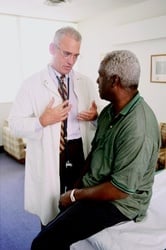Prostate cancer is the most common non-skin cancer among American men. Prostate cancers usually grow slowly. Most men with prostate cancer are older than 65 years and do not die from the disease.
Symptoms
Men can have different symptoms for prostate cancer. Some men do not have symptoms at all. Some symptoms of prostate cancer are difficulty starting urination, frequent urination (especially at night), weak or interrupted flow of urine, and blood in the urine or semen.
Risk Factors
There is no way to know for sure if you will get prostate cancer. The older a man is, the greater his risk for getting prostate cancer. Men also have a greater chance of getting prostate cancer if they are African-American or have a father, brother, or son who has had prostate cancer. Learn more and talk to your doctor before you decide to get screened or treated for prostate cancer.
Screening Tests
Two tests are commonly used to screen for prostate cancer—
- Digital rectal exam (DRE): A doctor or nurse inserts a gloved, lubricated finger into the rectum to estimate the size of the prostate and feel for lumps or other abnormalities.
- Prostate specific antigen (PSA) test: Measures the level of PSA in the blood. PSA is a substance made by the prostate. The levels of PSA in the blood can be higher in men who have prostate cancer. The PSA level may also be elevated in other conditions that affect the prostate. A PSA test can find prostate cancer earlier than no screening at all. However, the PSA test may have false positive or false negative results. This can mean that men without cancer may have abnormal results and get tests that are not necessary. It could also mean that the test could miss cancer in men who may need to be treated. Talk to your doctor about the right decision for you.
While the exact causes of prostate cancer remain unknown, medical research has identified well-established risk factors with which men should be familiar, such as age, family history, and race. By working to raise awareness of prostate cancer, men can make more informed decisions about their health – including choices which may help prevent cancer, such as avoiding smoking, maintaining a healthy diet and weight, and exercising regularly.




